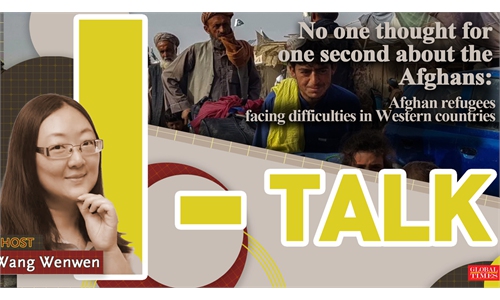IN-DEPTH / DIPLOMATIC CHANNEL
China will continue to support Afghanistan as it transitions from chaos to stability: Chargé d’Affaires of Chinese Embassy in Afghanistan
A friend in need
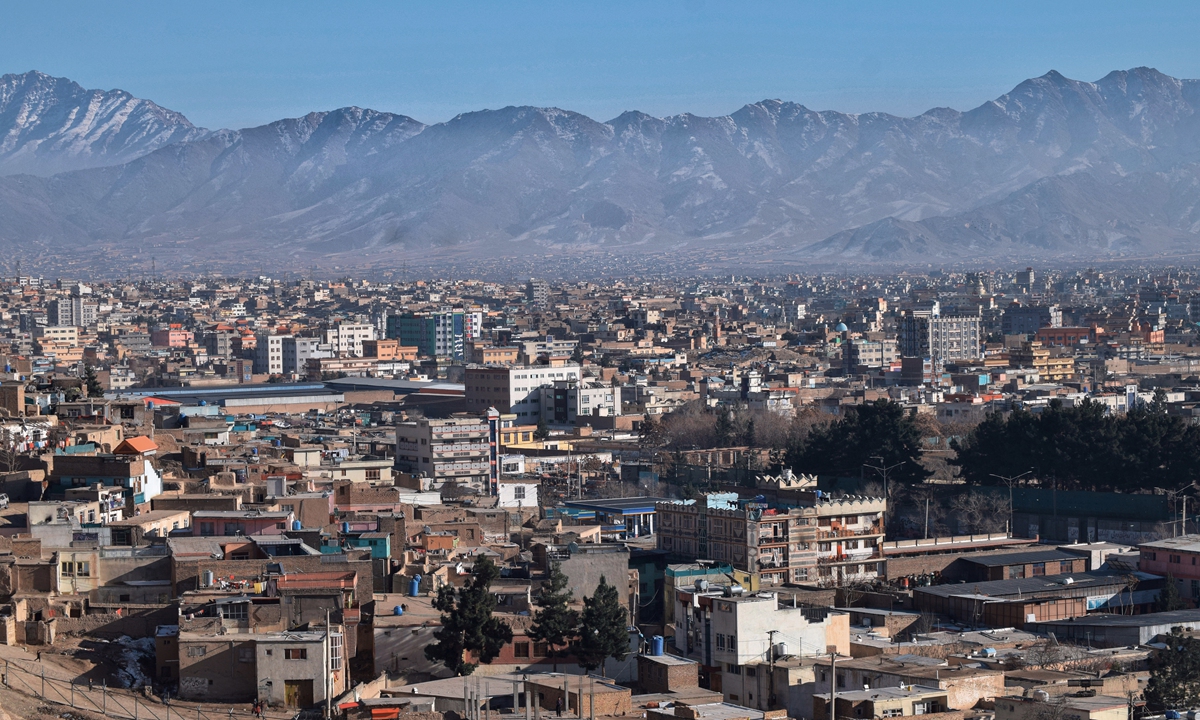
An aerial view of Kabul, Afghanistan Photos: VCG
Editor's Note:
On August 30, 2021, with celebratory fireworks lighting up the Kabul night sky, the US completed its withdrawal from Afghanistan, ending its 20-year presence in the country after its October 2001 invasion. Afghanistan has had two years to explore its own path for development. How has the Afghan interim government performed in solving the problems in Afghanistan? And how have China-Afghanistan relations developed? Global Times reporters Liu Xin and Xing Xiaojing (GT) interviewed Zhao Haihan (Zhao), Chargé d'Affaires of the Chinese Embassy in Afghanistan, to get his views on these and other questions, for an exclusive report.
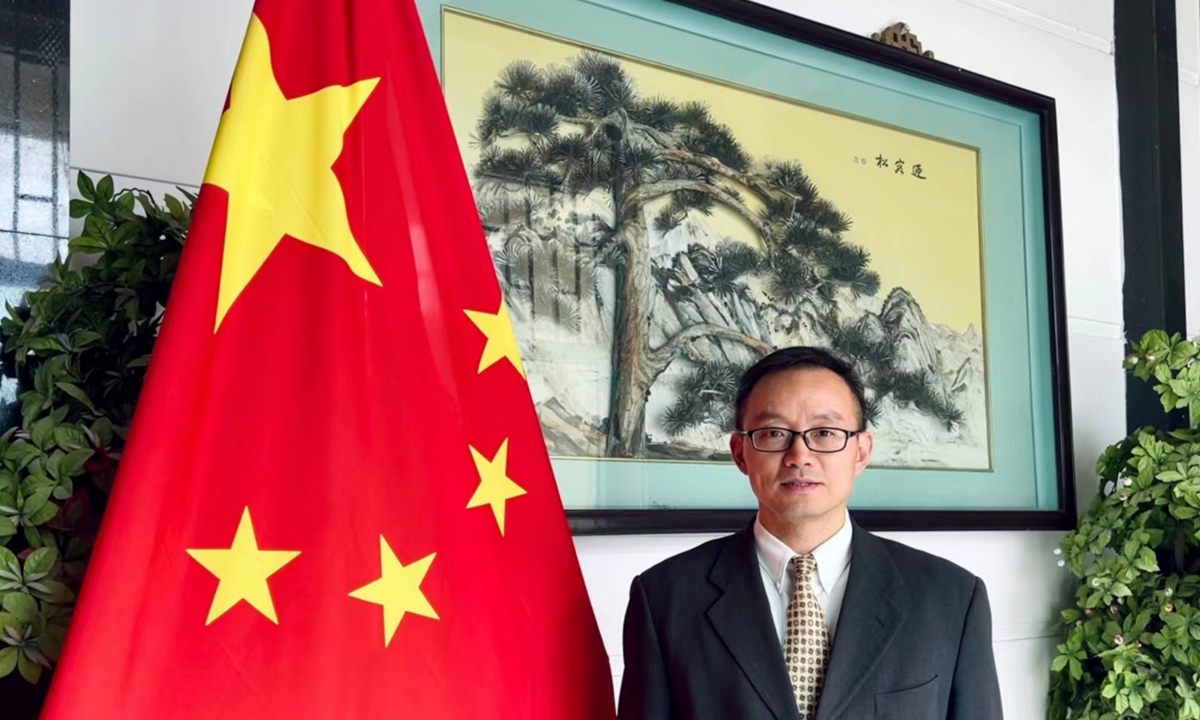
Zhao Haihan, Chargé d'Affaires of?the Chinese Embassy in Afghanistan Photo: Courtesy of Chinese Embassy in Afghanistan
GT: How do you view the performance of the Afghan interim government, which has been in power for two years? How do you feel about being in Afghanistan?
Zhao: Since the establishment of the Afghan interim government two years ago, it has been committed to promoting national peace reconstruction and independent development, actively engaging in foreign exchanges and cooperation, and has taken a series of practical measures in areas such as economic development, corruption eradication, drug prohibition, improvement of people's livelihoods, and social security, achieving certain results. The international community should give an objective and fair assessment.
The Chinese Embassy in Afghanistan staff has been stationed in Kabul. Over the last two years, especially this year, in our daily lives, we can feel that this country is gradually recovering. Economic and social development is slowly improving, prices and exchange rates are stable, and some infrastructure construction and large-scale energy and water projects are actively progressing, with trade with neighboring countries continuously developing.
In the reports by some Western media outlets, Afghanistan seems to be on the verge of economic collapse with starving bodies everywhere. But you will see completely different scenes if you visit major cities in Afghanistan: Daily necessities and supplies are basically available; there is a wide variety of food and vegetables, and the supply of electricity, communication, and fuel is also stable, with social order being well-maintained; the price of the staple food, naan, is less than 10 Afghanis (equivalent to 7 cents yuan), or even cheaper.
It is worth mentioning that the majority of the people and foreign diplomats believe that compared with two years ago, the overall security situation in Afghanistan has seen positive improvements, and people can now freely travel throughout the country, with an increase in foreign tourists. According to the Afghan Foreign Minister, there were about 70,000 foreign tourists visiting Afghanistan, including 10,000 from Europe, in 2022.
Afghanistan still faces many challenges at present. However, let's not forget that this country has just experienced 20 years of war, is starting from scratch, and is a fragmented state. Its economic development heavily relies on foreign aid, and its per capita GDP has always been the lowest in the world.
The interim government of Afghanistan took over a mess and faced external economic blockades, financial sanctions, asset freezes, and other difficulties. Achieving these development results in just two years and maintaining national unity and overall stability is not easy.
GT: On May 6, during the 5th China-Afghanistan-Pakistan Trilateral Foreign Ministers' Dialogue held in Pakistan, a joint statement was issued, clearly stating that terrorism and terrorist organizations including the "East Turkistan Islamic Movement" (ETIM), will not be tolerated. It was also the first time that the Afghan Taliban made a written commitment to not allow the "ETIM" and other forces to engage in terrorist activities. What is the current situation regarding the activities of ETIM members in Afghanistan, and what is the significance of this written commitment by the Afghan Taliban for the promotion of regional counter-terrorism and security cooperation?
Zhao: The "ETIM" is a terrorist organization listed by the United Nations Security Council and recognized by the Chinese government in accordance with the law. The forces of the "ETIM" based in Afghanistan still pose a serious threat to the security of China, Afghanistan, and the region. The "three forces" - terrorism, separatism and extremism, based in Afghanistan are also still major security threats to the region and even the world.
The Afghan interim government's written commitment to not allow the "ETIM" and other forces to engage in terrorist activities is of great significance for the future development of China-Afghanistan relations and the promotion of regional counter-terrorism and security cooperation. China supports Afghanistan's efforts to combat all forms of terrorism and violence and maintain national security and stability.
We hope that the Afghan side will effectively fulfill its commitments, take more effective measures, and resolutely combat all terrorist forces, including the "ETIM."
China calls on the international community to firmly support Afghanistan in combating the "three forces," support Afghanistan in taking active measures to cut off the financial channels of terrorism and combat the recruitment and cross-border movement of terrorists, and the dissemination of violent and terrorist audiovisual materials, curb extremism, youth radicalization, and the spread of terrorist ideology, and eradicate hidden terrorists and their hiding places.
China will also actively encourage the international community to strengthen bilateral and multilateral counter-terrorism and security cooperation, provide anti-terrorism materials, equipment, and technical assistance to Afghanistan, support Afghanistan in implementing comprehensive counterterrorism measures, address both the symptoms and root causes of terrorism, and prevent Afghanistan from becoming a haven, breeding ground, and source of terrorism again.
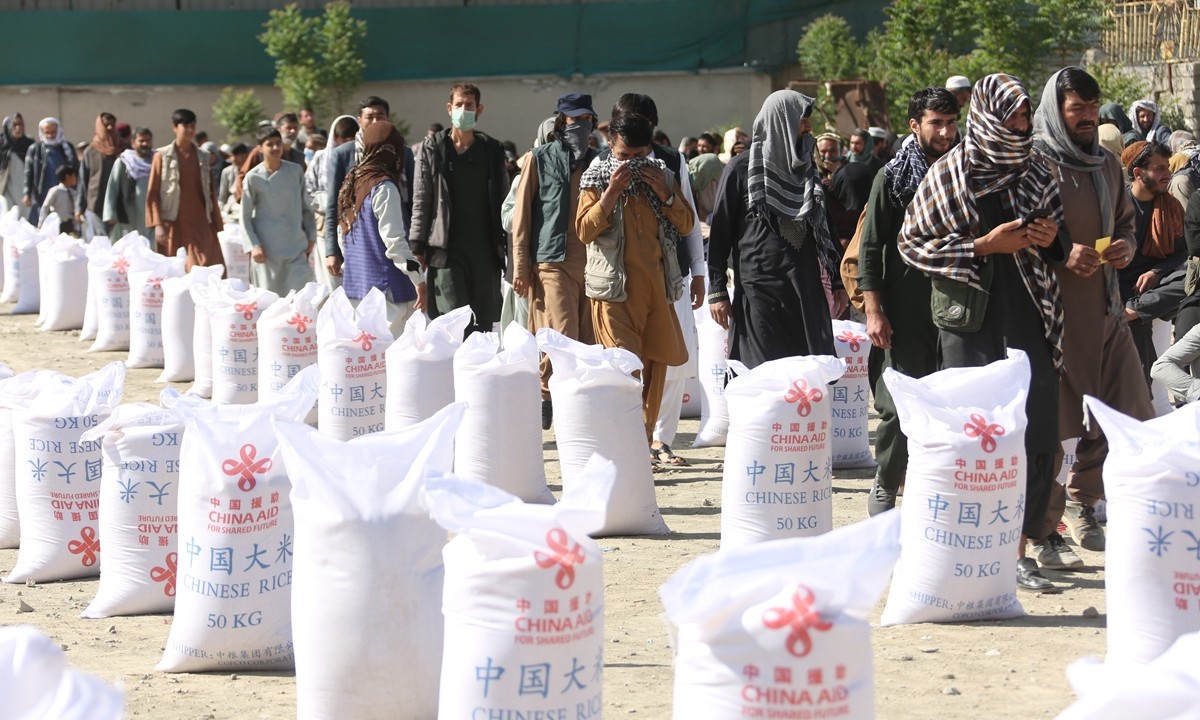
Afghan people receive food aid from China in Kabul, on April 23, 2022. Photo: Xinhua
GT: China has always emphasized its support for peace, development, and a political solution to the Afghan issue. Could you please introduce China's specific measures and future plans in assisting Afghanistan?
Zhao: The friendly bilateral cooperation between China and Afghanistan has always been a key factor in China's unique role in the Afghan issue. The Afghan government and society have widely recognized that China is the only major country and neighboring country in history that has never bullied Afghanistan, and China has always pursued cooperation, assistance, and friendship with Afghanistan.
In the last two years, in order to avoid a humanitarian crisis, China has provided timely humanitarian assistance to Afghanistan, including the provision of vaccines, medicines, and winter supplies, totaling 300 million yuan. In March 2022, China also provided 1 billion yuan in unconditional assistance to Afghanistan for humanitarian, educational, medical, and rural construction projects.
China has also provided a large amount of assistance to Afghanistan in the form of food, emergency supplies, earthquake relief, and through other means using channels such as the South-South Cooperation Assistance Fund, the Red Cross, local governments, and civil society, helping the Afghan people to cope with various crises.
At the same time, China's assistance projects in Afghanistan, such as the building of Kabul University, vocational and technical education colleges, low-cost housing, and a hospital, have been successfully handed over or are about to resume construction. Personnel training and student exchange programs are also progressing in an orderly manner, cultivating a large number of talents in various fields in Afghanistan.
In terms of economic and trade cooperation, we have opened the "Pine Nuts Air Corridor," granting Afghanistan 98 percent tariff-free treatment for products, restoring direct flights between China and Afghanistan, and promoting practical cooperation in major projects.
Currently, China and Afghanistan are actively exploring enhanced connectivity construction under the framework of the Belt and Road Initiative (BRI), and negotiating to promote the export of more Afghan specialty agricultural products such as pomegranates, almonds, and apricots to China. All these practical measures are being taken to support the Afghan people's economic development, income generation, and improvement of livelihoods through concrete actions.
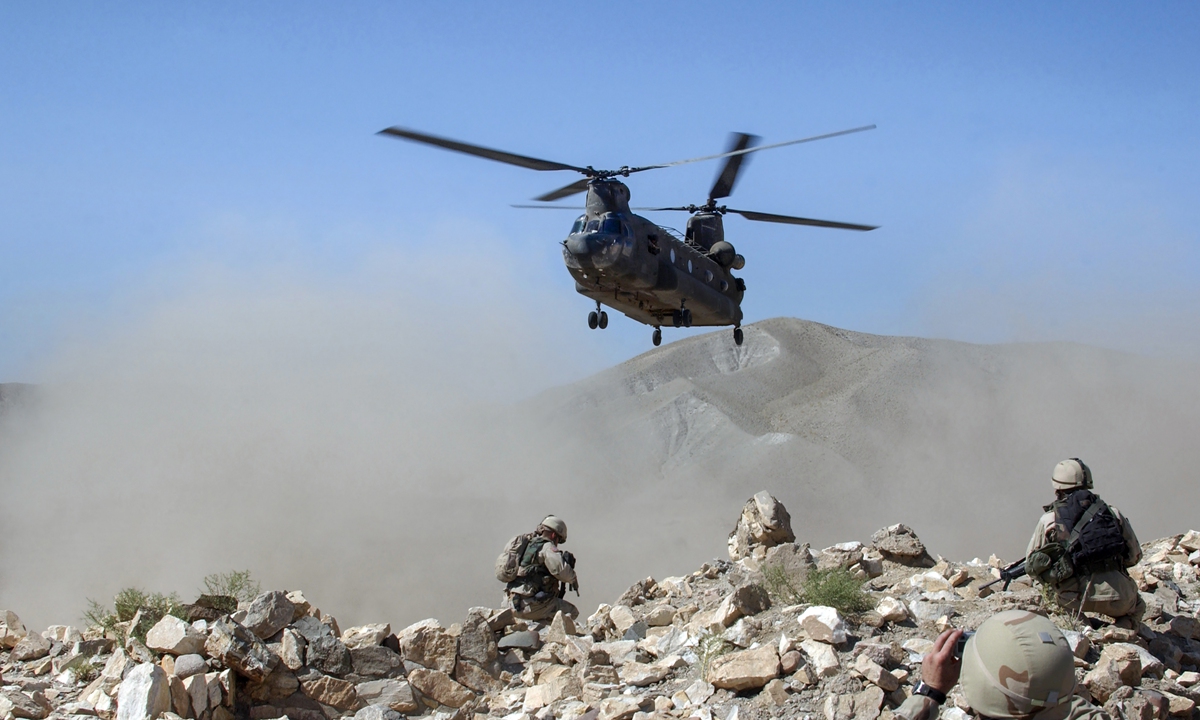
A CH-47 Chinook helicopter creates a cloud of dust in Afghanistan September 6, 2004. Photo:VCG
GT: The Global Times launched a petition in February 2022 calling for the unconditional return of life-saving money to the Afghan people by the US, which has received a lot of attention. How do you view the Chinese public's concern for the livelihood of the Afghan people? How do you think China and Afghanistan can further strengthen people-to-people exchanges and promote friendly cooperation?
Zhao: China and Afghanistan are traditional friendly neighbors, and the ancient Silk Road has closely connected the people of the two countries, with a long history of friendly exchanges. Both China and Afghanistan believe in the cultural concept of "a close neighbor is better than a distant relative" and have a fine tradition of mutual assistance.
Since significant changes have occurred in Afghanistan, the safety and wellbeing of the Afghan people have always concerned the Chinese people. Having grown and risen from hardship, the Chinese people deeply empathize with the suffering of the Afghan people and have always provided assistance and steadfast support in various ways to help them overcome their hardships. This is a continuation of the traditional spirit of solidarity and cooperation between the two peoples and a reflection of Chinese people's pursuit of justice and the well-being of the world.
The relationship between countries lies in the affinity between their people. Today, with the overall situation in Afghanistan transitioning from chaos to stability and the complete dispersal of the shadow of the COVID-19 epidemic, people-to-people exchanges between China and Afghanistan are ushering in new opportunities.
China will continue to uphold the principles of amity, sincerity, mutual benefit, and inclusiveness in its neighborhood diplomacy, and carry out more pragmatic cooperation with Afghanistan in various fields. Together with the Afghan people, China will continuously consolidate the foundation of popular support for friendly relations between the two countries and work hand in hand to build a China-Afghanistan community of shared future.
GT: Can you give more examples of the close and friendly cooperation between China and Afghanistan?
Zhao: The friendly cooperation between China and Afghanistan is reflected in various aspects, for example, in the smooth communication and cooperation between our foreign ministries.
I remember one time when we wanted to have face-to-face exchanges with senior officials from various departments of the Afghan interim government regarding some cooperation issues. After receiving our request, the Afghan side quickly arranged for our ambassador to Afghanistan to meet with the acting prime minister and six cabinet ministers within a week. All the protocol arrangements were seamless, efficient, and smooth. Some foreign embassy colleagues heard about this and couldn't help but admire that only Chinese diplomats could receive such treatment.
Furthermore, the Afghan people have great enthusiasm for learning Chinese. We often encounter fluent Chinese speakers among the Afghan people at airports and other public places. This includes not only students from Confucius Institutes and those who have studied in China, but also many ordinary people who have self-studied Chinese and hope to engage in trade and tourism in China in the future.
GT: At the Central Asia Summit in May, Chinese leaders emphasized the role of platforms such as the Afghanistan Neighboring Countries Coordination Mechanism in promoting Afghanistan's path to reconstruction. In terms of promoting peace and reconstruction in Afghanistan, what specific diplomatic efforts and cooperation methods will China adopt?
Zhao: As a close neighbor and sincere friend to Afghanistan, China hopes for peace and stability in Afghanistan more than any other country. China has built platforms, created conditions, and contributed Chinese wisdom and solutions to promote peace and stability in Afghanistan, earning unanimous praise from the Afghan people and the international community.
Especially after significant changes in the Afghan situation, China advocated for the establishment of the Afghanistan neighboring countries coordination mechanism, leveraging the advantages of neighboring countries to consolidate regional consensus and cooperation, and played a constructive role in ensuring a smooth transition in the Afghan situation.
Currently, Afghanistan is at a critical juncture of transitioning from chaos to stability, with challenges and opportunities, and difficulties and hopes all coexisting. As a builder of world peace, contributor to global development, preserver of international order, and a friendly neighbor to Afghanistan, China will continue to provide assistance within its capabilities for Afghanistan's reconstruction and development.
China will fulfill its aid commitments to Afghanistan, steadily promote economic and trade investment cooperation, actively engage in cooperation in areas such as healthcare, poverty alleviation, agriculture, and disaster prevention and reduction, deepen cooperation in jointly building the BRI, support Afghanistan in leveraging its geographical advantages to integrate into regional economic cooperation and connectivity, transform from a landlocked country to a land-linked country, and help Afghanistan emerge from the shadows of war and regain its ancient Silk Road glory.
At the same time, we will continue to uphold justice and advocate for the Afghan people in the international community, urging relevant countries, as the initiators of the Afghan issue, to learn from their mistakes, face the severe humanitarian, economic, and security risks and challenges in Afghanistan, immediately lift sanctions on Afghanistan, return Afghan overseas assets, and fulfill their commitments to humanitarian assistance to Afghanistan.
GT: What are your expectations for the future of Afghanistan?
Zhao: Afghanistan is a brilliant pearl on the ancient Silk Road, which has created a splendid and glorious culture and made unique contributions to the exchanges and mutual learning of different civilizations between the East and the West, as well as the progress and development of human civilization.
However, due to its important geographical location, known as the "heart of Asia," it has always been a strategic place for the great powers to compete, and its fate has been tumultuous. For a long time, Afghanistan has suffered from the ravages of war and turmoil, and its people have experienced hardships, causing this pearl to be repeatedly covered in dust.
Afghan people are diligent and kind, just like we the Chinese, and they are constantly striving for self-improvement. Afghans often mention that they have defeated three superpowers in a hundred years, which makes its nickname, the graveyard of empires, well deserved.
Nowadays, with the withdrawal of foreign troops, the Afghan people have ushered in an opportunity to truly control their own destiny and enter into a new era of independence, peace, and development.
In our contacts with Afghan officials, we can clearly feel their strong sense of national pride and their desire to change the fate of their country through development. They often say that today's Afghanistan is very similar to the new China of more than 70 years ago. They have driven away foreign aggressors and opened a new chapter in national construction.
However, there is still much to be done, and the road ahead is long. They lack experience and capabilities, so they strongly hope to deepen cooperation with China, their thousand-year neighbor, learn from China's governance experience, and achieve lasting peace and prosperity with China's help.
As an unwavering friendly neighbor, China will continue to support Afghanistan's independent and self-reliant development and make positive contributions to its prosperity and the promotion of regional peace and stability.
If the interim government of Afghanistan can seize the opportunity, further open up and engage in inclusive governance, pursue moderate and stable policies, and actively explore a modern development model that suits the Afghan national conditions, it is entirely possible to lead the Afghan people onto the path of peaceful reconstruction and prosperous development. I personally have confidence in this.
